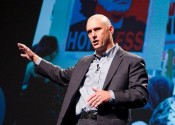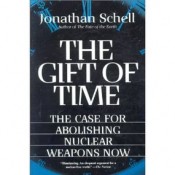Q&A: Mark Mykleby, Natl Security=Sustainability
Written on April 8th, 2013 |
Aired: 04/07/13
In the preface to an article entitled A National Strategic Narrative, Anne-Marie Slaughter of Princeton says we need a narrative that confronts some of the following questions, “Where is the United States going in the world? How can we get there? What are the guiding stars that will illuminate the path along the way? We need a story with a beginning, middle, and projected happy ending that will transcend our political divisions, orient us as a nation, and give us both a common direction and the confidence and commitment to get to our destination.” She also writes, “In one sentence, the strategic narrative of the United States in the 21st century is that we want to become the strongest competitor and most influential player in a deeply inter-connected global system, which requires that we invest less in defense and more in sustainable prosperity and the tools of effective global engagement.”
Over time, the best way to shape the force of the future is to invest in the science, technology, education, and training that will equip our soldiers, sailors, airmen, and marines to adapt to an increasingly complex and dynamic environment. The hardware and software we buy and build are secondary to the gray matter we must cultivate now.
When I hear that someone high up in the military is talking seriously about sustainability, I take notice.
www.newamerica.net
In Computers We Trust: The Thrill of Victory, the Agony of Defeat
Written on August 16th, 2012After a trip of a hundred million miles, the world cheered the landing August 6th of the rover Curiosity on the surface of Mars. In the 7 minutes after the ship entered our neighboring planet’s atmosphere, it sped up to 13,000 mph and then slowed to 1.7. Aiming for a target area of less than 50 square miles, the landing involved 76 pyrotechnic devices, a huge parachute, rocket thrusters, and finally a tether to drop the rover on land.

At that distance, it takes 14 minutes for a signal to reach the earth, so at the moment the team got word that the ship had entered Martian atmosphere, 7 minutes had already passed since the rover had either landed or crashed. Half a million lines of code, $2.5 billion dollars, NASA’s reputation and future funding at risk, every step of the landing pre-programmed, zero margin of error, and the result: complete and utter success.
But not all the recent news regarding our reliance on computers has been as reassuring.
The August 3rd Los Angeles Times featured these two headlines: Knight Capital trading debacle shows Wall Street frailties and Patient data outage exposes risks of electronic medical records. That’s a pretty solid one two punch. How we finance society and how we save lives are being increasingly entrusted to computer systems, presenting risks on a massive scale.
August 8th, a story appeared at wired.com and spread through the net: How Apple and Amazon Security Flaws Led to My Epic Hacking. Gmail was deleted, Twitter and ICloud compromised, hard drive wiped clean, photos and messages gone forever. This wasn’t the story of some naïve webster attacked visiting East European porn sites. No, this happened to Mat Honan, a reporter for Wired, compromised by his accounts with Apple and Amazon, two of the most trusted and successful online entities.
Knight Capital Group, a brokerage that handles nearly 11% of all stock trading in U.S. companies…lost $440 million in less than an hour — nearly four times the company’s profit last year… Knight’s software executed in a matter of minutes a series of trades that were designed to be done over a period of days. This glitch is just one of a series that have plagued Wall Street in recent years.
In the case of the medical info, we’ve been told that we must computerize our healthcare records and operations to be more efficient, effective, and cut costs. The medical field has been ridiculed for it’s continued reliance on paper.
As part of the 2009 economic stimulus, the Obama administration is spending more than $27 billion to speed the switch to computerized patient records… In 2015, the government will begin imposing financial penalties against hospitals and doctors that don’t adopt electronic health records.
Cerner Corp., a leading supplier of electronic health records to hospitals and doctors, said “human error” caused the outage July 23 [in which] …Dozens of hospitals across the country lost access to crucial electronic records for about five hours.
Many hospitals choose to outsource [electronic record keeping]… to save money or to avoid having to hire the staff required. Cerner’s revenue from remote hosting and similar services grew 20% last year.
When the computers went down last week, some hospitals lacked backup sources for critical information. A new team of doctors and nurses came on duty, and for hours were unable to read the reports of the previous shift.
Doctors and hospitals interviewed said they weren’t immediately aware of any patients harmed by the disruption, but they expressed concern about how long the outage lasted and the failure of any Cerner backup system to kick in.
In an op-ed in the August 9th New York Times, Errant Code? It’s Not Just a Bug, former software engineer Ellen Ullman makes the following points: It is impossible to fully test any computer system and there is no such thing as a body of code without bugs.
I don’t have a brilliant answer for what any of this means or what we must do in response. But I certainly want to raise questions. How vulnerable are we? How serious are the threats we face? How dangerous? Will we ultimately experience irreparable calamity? Are there obvious lessons or conclusions? What must we do to minimize the chances of something going horribly wrong?
Q&A: JONATHAN SCHELL, Author – The Gift of Time
Written on March 23rd, 2011 |
Aired 03/20/11
JONATHAN SCHELL was a writer and editor at the New Yorker between 1967 and 1988. A recipient of a MacArthur Foundation grant for writing on Peace and Security, Schell now teaches at Wesleyan University and the New School and is the Harold Willens Peace Fellow at The Nation Institute. He is the author of several books, including The Fate of the Earth; The Gift of TIme: The Case for Abolishing Nuclear Weapons Now; and A Hole in the World.
Q&A: MALOU INNOCENT – Foreign Policy Analyst, Cato Institute
Written on July 13th, 2010 |
Aired 07/11/10
MALOU INNOCENT is a Foreign Policy Analyst at the Cato Institute, and her primary research interests include Middle East and Persian Gulf security issues and U.S. foreign policy toward Pakistan, Afghanistan, and China. Following dual Bachelor of Arts degrees in Mass Communications and Political Science from the University of California at Berkeley and a Master of Arts degree in International Relations from the University of Chicago, she has appeared as a guest analyst on CNN, BBC News, Fox News, Al Jazeera, CNBC Asia, and Reuters, and has published in journals such as Foreign Policy, Wall Street Journal, Asia, Christian Science Monitor, Armed Forces Journal, the Guardian, and the Huffington Post.
Join us as we talk about Afghanistan, Pakistan, Iraq, the Middle East, the cost of foreign adventures to domestic well-being, and hopefully some issues and areas that I haven't even thought of yet.
Q&A: JOSEPH CIRINCIONE, President of PLOUGHSHARES FUND and Author
Written on April 16th, 2009 |
Aired 04/14/09
Joseph Cirincione joined Ploughshares Fund as president in March 2008. He is author of Bomb Scare: The History and Future of Nuclear Weapons and served previously as senior vice president for national security and international policy at the Center for American Progress and as director for nonproliferation at the Carnegie Endowment for International Peace for eight years. He worked for nine years in the U.S. House of Representatives as a professional staff member of the Committee on Armed Services and the Committee on Government Operations, and served as staff director of the bipartisan Military Reform Caucus. He teaches at the Georgetown University Graduate School of Foreign Service and is a member of the Council on Foreign Relations.
His previous books include two editions of Deadly Arsenals: Nuclear, Biological and Chemical Threats, (2005 and 2002), and previous reports include Universal Compliance: A Strategy for Nuclear Security (co-author, March 2005) and WMD in Iraq (co-author, January 2004). He is the author of over 200 articles on defense issues, the producer of two DVDs on proliferation, the former publisher of the comprehensive proliferation website, Proliferation News, and is a frequent commentator in the media. In the past two years has delivered over 150 speeches around the world and appeared in the 2006 award-winning documentary, Why We Fight.
Cirincione is an expert adviser to the Congressional Commission on the Strategic Posture of the United States, chaired by former Secretary of Defense William J. Perry and former Secretary of Energy and Secretary of Defense James R. Schlesinger. He also serves as a member of the Advisory Committee to the Commission on the Prevention of WMD Proliferation and Terrorism, headed by former Senator Bob Graham (D-FL) and former Senator Jim Talent (R-MO).
